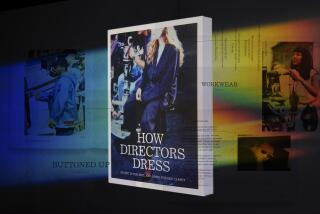Stepping behind the camera is a natural move for some actors
“I always cringed when I heard about actors who directed,” says John Krasinski. “I remember someone asking me if I would ever direct when I was on ‘The Office,’ and I said, ‘Absolutely not.’ ”
Oh, how times have changed — and not just for Krasinski, who made waves with his writer-director-actor combo this year in “A Quiet Place.” Bradley Cooper is making waves of his own for his directing debut with “A Star Is Born,” and several other actors are taking their own seats in the director’s chair. “Quiet Place” is Krasinski’s third feature outing; Marielle Heller’s second, “Can You Ever Forgive Me?,” was released last month even as she finishes shooting her third, the untitled Tom Hanks/Mr. Rogers movie; Australian actor Joel Edgerton released his second feature, “Boy Erased,” early this month; and both Paul Dano and Rupert Everett are making their debuts, “Wildlife” and “The Happy Prince,” respectively.
But the path to go behind the camera looks different for every director. In Everett’s case, it was the only way to get his passion project about Oscar Wilde made. “It was a matter of necessity,” he says. “All of the directors I wanted to direct the film turned me down. There wasn’t anything particularly mysterious.”
Heller, meanwhile, originally found her voice as a writer-director after landing the rights to 2015’s “Diary of a Teenage Girl.” “I thought for a long time that the best way to tell stories was as an actor,” she says. “Then, I started to realize that writing was giving me a similar feeling. After writing ‘Diary,’ the thought of somebody else directing it was just really hard for me, so I had to figure out how to do that.”
Seeing how the sausage gets made on a set gives curious actors a crash course, in-person master class in how to put together a film, which is how it went for Krasinski, who sat in the writers’ room, the edit bay and behind directors to get a “full experience” before his first shot at directing.
But learning on set was more casual years ago, says Everett. “When I started out in the movies, everything happened at such a slow-motion pace, you had not much else to do but watch how the shots were set up,” he says. “Whereas, today, things move so fast you have to focus on your lines.”
Having been (or continuing to be) an actor is a huge asset in the business, these directors say, because they better understand the process and can talk to an actor in his or her own language.
“I wanted to give [my actors] the experience I would want as an actor,” says Dano. “I found directing to be like parenting: I’m creating this place for this person to thrive. Hopefully, you put the camera in the right place and give them the room to try and fail.”
Heller agrees. “There’s a trust that comes from knowing I understand what actors want, and hopefully they know what I’m asking of them,” she says. “I don’t feel afraid to talk to them about what I might want or need or if I want them to do it differently. Hopefully, I can do that in ways that work within the process and doesn’t pull them out, or make them feel like they’re being attacked.”
Still, even with acting experience, it’s not necessarily easy to start giving the orders. “I was … nervous filming on the first day, and every day I thought about burning it down because I failed,” says Dano. “But there were moments of great joy.”
Actually being in the film while directing also has its benefits, at least for some actor-directors. For Krasinski, “It was bizarrely easier for me to be in the movie and direct it — there are moments when you’re in the zone, and I can stay with the actors, and say ‘go again’ as we’re rolling. It feels more like a play we capture on camera than a movie.”
Another advantage is the ability to avoid conflicts with your leads. “To be quite honest, I really enjoyed working with me,” quips Everett, who stars as Wilde in his film.
But directing and starring’s not for Heller. “Directing is so frickin’ hard and requires 110% of myself and my brain — I definitely couldn’t do both at the same time.”
Still, as hard as directing can be, it’s also addictive.
“There’s a pain to making a film,” says Everett. “Every day, I would say, ‘I’ll never do this again.’ But in the end, it’s like childbirth — and you forget the pain and say, ‘I want to have another baby.’ ”
More to Read
From the Oscars to the Emmys.
Get the Envelope newsletter for exclusive awards season coverage, behind-the-scenes stories from the Envelope podcast and columnist Glenn Whipp’s must-read analysis.
You may occasionally receive promotional content from the Los Angeles Times.






